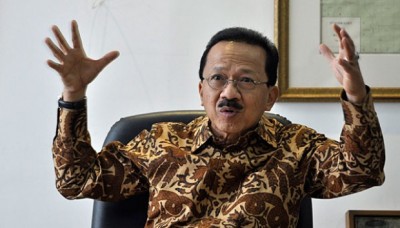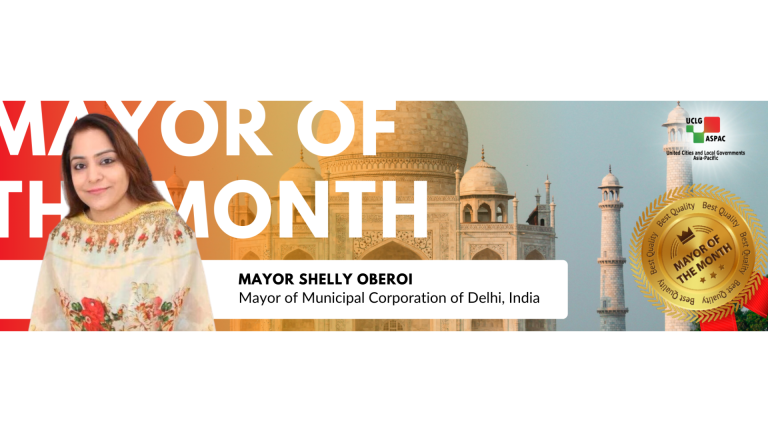Wednesday, 23 November 2011
Keynote address Asia Water Summit
Governor of DKI Jakarta
Dr. Fauzi Bowo
Jakarta
17th November 2011
Ladies and gentlemen, members of the Unites Cities and Local Government, participants of this inaugural Asia Water Summit, representatives from Government Ministries, exhibitors domestic and international present in this venue today, thank you for inviting me to this first Asia Water Summit. Today I am here not just as the Governor of Jakarta but also the President of the United Cities and Local Governments Asia Pacific.
The theme of today’s seminar is “Towards Sustainable Water Solutions”, touches one of the central nerves of our daily lives. As we all know the pace of urbanization in this Asia Pacific region is unparalleled by any other area in the world. Eleven of the worlds Mega city with a population of more than 10 million are located in this region. Urban growth is projected to double from 3.3 billion in 2007 to 6.4 billion in 2050. With this new emphasis on urbanization, the management of water is central to the sustainability of cities in the region.
Like the other mega cities in the region, Jakarta has always had to make peace with the power of water, as water has been a blessing but also a curse to this city. The Dutch colonial government experienced floods and had started water management as far back as 1621, only two years after Batavia was built, complete with a system of canals.
Thirteen rivers flow across the city of Jakarta and forty percent of its land consists of flat land that is below sea level. The water in which Jakarta has to deal with is river water from the upstream, seawater which has encroached in North Jakarta and the monsoon rain. Jakarta is surrounded by water from all directions and the management of this water has been crucial for the sustainability of this city as there are ten million people living in Jakarta and this number is growing.
One of the central focuses of my city administration is water issues, the wanted and the unwanted water. Water is a crosscutting issue that demands a coordinated approach, and water does not recognize administrative or state boundaries. We have taken two approaches on water management. The first approach is the integrated administrative water resources approach system. Water specialists have worked with experts from other departments in the City Administration, ensuring that water management is not just about technical issues instead it is about the management of human lives and economic growth. Second, a territorial integrated approach to manage the same watershed areas which also belongs to other administrative areas, for example the Ciliwung river watershed runs through neighboring areas, the Province of West Java and City of Bogor.
It is my personal view that this territorial integrated approach could be expanded to an Asia Pacific region dialogue specifically on the management of water issues. Many of the eleven Mega cities in the region are facing the same problems Jakarta is in dealing with water issues and there many lessons learned which can be shared among us.
I have no doubt that water management is essential in achieving sustainable development and the Millennium Development Goals, aimed at reducing poverty. Jakarta proved that with the completion of the East Flood Canal in February 2010, two million people living along the canal, have been free from floods and the catastrophes flooding brings, and now they are experiencing better economic conditions.
During the large 2007 flood, Pak Sarjian a motor bike driver offering rides on his motorbike as a transportation service, living in East Jakarta had no income for two weeks due to the floods as all the roads were flooded with water that took a long time to drain away. After the East Flood Canal was completed, Pak Sarjian’s business improved, and there has not been a day when he has been unable to work because of deep inundations or floods, even after heavy rain has fallen.
However, the East Flood Canal does not solve all of the threat of flooding in Jakarta. The management of flooding needs two essential ingredients from local governments, these are commitment and consistency in planning and ensuring that the problems are solved step by step.
Demand of clean water for day-to-day living has also been on the increase and an issue as crucial as managing the flooding. One of the valuable experience for Jakarta has been whatever actions are taken to reduce poverty, we must also recognized that increasing the economic well being of the very poor will ultimately translate into higher demand for natural resources, including water.
As the population of Jakarta increases, so does the demand for clean water. This demand has led to withdrawal of underground water by people for their daily domestic needs and for industrial purposes, and this in turn has caused land subsidence in parts of Jakarta. Combined with a rise in sea level of half a meter and continuous land subsidence, parts of Jakarta could permanently submerge. When there is a heavy down pour, these submerged area become little ponds trapping the water and causing prolong inundations. This is why the Jakarta government has also constructed a system of polders, where water is pumped out of the inundated areas to larger channels and enabling the water to find its way to the sea.
Anticipating the increase of demand of clean water, the City Administration has started to build a ‘water factory’ outside Jakarta, which will channel water, hopefully piped it to the city. Demand for clean water remains one of the biggest challenges the city faces.
It is from these experiences of attempting to manage and harness the wanted and the unwanted water that Jakarta has also learned, that water often described as a gift of nature, essential for the wide variety of human and ecological benefits, needs good management. This management includes financial costs. Like the energy sector, water also share the same challenges and is being driven by demographics, economic, social and technological processes.
Besides population pressures and the impact this has brought to the management of water in Jakarta, there is also the added burden of climate change. Like water, the problem of climate change is a global one and it does not recognize state or administration boundaries. There is a consensus among climate scientists that climate warming will intensify, accelerate or enhance the global hydraulic cycle. An accelerated global water cycle associated with global warming could have important consequences for the world’s water resources.
A study done in 2009 of 530 urban areas in the seven countries in the Asia Pacific region found that Jakarta’s five administrative divisions are included in the list of the ten largest urban areas vulnerable to climate change. Three of them are at the top of the list.
Climate change for Jakarta has meant an increase of sea level. The swelling of seawater and the melting of glaciers and ice sheets at the poles cause the surface of the sea to rise. The rise in sea level can hasten coastal erosion, cause the intrusion of sea water into ground water, destroy coastal swamplands and submerge small islands. A rise in sea level of between 5 and 8 centimeters will have a severe impact on the city of Jakarta, which is already vulnerable to floods and water run-off after storms.
Sustainable Water Solutions to ensure Jakarta becomes a strong city in the future able to meet the needs and the challenges ahead requires a continued integrated approach to water management and long term planning. Besides that a change is needed in the way the people of Jakarta relate to water, where water must start to be treated as a scare resource and efficiency in its usage must becomes a daily habit.
Technology has an important role in water management today but technology innovation today is driven by both human wants and need. With the bulk of technological innovation originating in developed countries, introducing appropriate technologies into developing countries is a key challenge of development. However, the key issue here is how to spread technological innovations as wide and as fast as possible in an affordable manner.
Ladies and gentlemen,
A strong Jakarta able to be sustainable in its water solutions means investing in water, as investment in environmental sustainability and water management will help prevent water–related disaster and will help grow the economy. Investment of water management will be repaid in livelihood security and reduction in health risks, vulnerability and ultimately poverty.
Jakarta has no option and is committed to sustain its integrated water resource management approach while at the same time it must start planning for the future. Jakarta is committed to reduce floods by 75 per cent in 2016. Studies done as part of safeguarding Jakarta for the next 50 to 100 years have shown that Jakarta needs to expand the polder system which is currently inland, into the sea area in North Jakarta. Making the sea part of the polder expansion, as Jakarta has very limited land. This sea wall defense system will protect the North Part of Jakarta from rising sea levels which are encroaching into North Jakarta and starting to affect ground water in that area.
The problems I discussed above is not unique to Jakarta, but also found in many parts in the Asia Pacific region. The issue of water sustainability is an issue which has been a challenge for all us and will remain so. As we have experienced, no one problem stands alone, all are intertwined. Water management cannot be separated from human behavior and climate change. Extreme weather conditions are predicted ahead, with much rainfall which may create flooding havoc around the region. One serious problem some of us are going to face if we don’t start addressing water seriously is food security. Off course national governments are mainly responsible for this, but because mayor and heads of local governments interact directly with local constituents, we are going to have to face the problem first and also very directly.
Finally let me close by quoting a Dutch expert advising the floods in Bangkok recently saying that ‘; water is such a do-or-die matter it should, where possible, be taken out of the political arena of contests’ which has been the experience in Holland and explains why they are world leaders in water management’. This is applicable for all of us in the region managing water resources.
Thank you
Fauzi Bowo
Photo credit: Courtesy of Tempo











